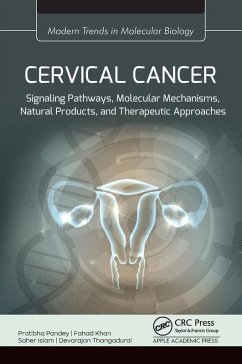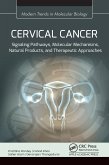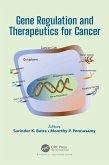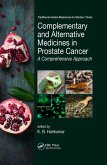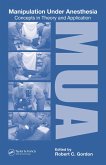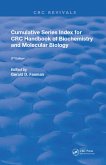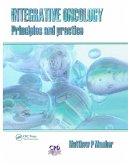Cervical Cancer (eBook, PDF)
Signaling Pathways, Molecular Mechanisms, Natural Products, and Therapeutic Approaches
Redaktion: Pandey, Pratibha; Thangadurai, Devarajan; Islam, Saher; Khan, Fahad
131,95 €
131,95 €
inkl. MwSt.
Sofort per Download lieferbar

66 °P sammeln
131,95 €
Als Download kaufen

131,95 €
inkl. MwSt.
Sofort per Download lieferbar

66 °P sammeln
Jetzt verschenken
Alle Infos zum eBook verschenken
131,95 €
inkl. MwSt.
Sofort per Download lieferbar
Alle Infos zum eBook verschenken

66 °P sammeln
Cervical Cancer (eBook, PDF)
Signaling Pathways, Molecular Mechanisms, Natural Products, and Therapeutic Approaches
Redaktion: Pandey, Pratibha; Thangadurai, Devarajan; Islam, Saher; Khan, Fahad
- Format: PDF
- Merkliste
- Auf die Merkliste
- Bewerten Bewerten
- Teilen
- Produkt teilen
- Produkterinnerung
- Produkterinnerung

Bitte loggen Sie sich zunächst in Ihr Kundenkonto ein oder registrieren Sie sich bei
bücher.de, um das eBook-Abo tolino select nutzen zu können.
Hier können Sie sich einloggen
Hier können Sie sich einloggen
Sie sind bereits eingeloggt. Klicken Sie auf 2. tolino select Abo, um fortzufahren.

Bitte loggen Sie sich zunächst in Ihr Kundenkonto ein oder registrieren Sie sich bei bücher.de, um das eBook-Abo tolino select nutzen zu können.
Focuses on new approaches to one of the major cancers of the female reproductive system-cervical cancer. Expounds on the idea that, modulation in various signaling pathways is responsible for cervical cancer pathogenesis, and inhibition of these crucial pathways could be a better therapeutic approach for cervical cancer management.
- Geräte: PC
- ohne Kopierschutz
- eBook Hilfe
- Größe: 9.2MB
Andere Kunden interessierten sich auch für
![Cervical Cancer (eBook, ePUB) Cervical Cancer (eBook, ePUB)]() Cervical Cancer (eBook, ePUB)131,95 €
Cervical Cancer (eBook, ePUB)131,95 €![Gene Regulation and Therapeutics for Cancer (eBook, PDF) Gene Regulation and Therapeutics for Cancer (eBook, PDF)]() Gene Regulation and Therapeutics for Cancer (eBook, PDF)74,95 €
Gene Regulation and Therapeutics for Cancer (eBook, PDF)74,95 €![Complementary and Alternative Medicines in Prostate Cancer (eBook, PDF) Complementary and Alternative Medicines in Prostate Cancer (eBook, PDF)]() Complementary and Alternative Medicines in Prostate Cancer (eBook, PDF)49,95 €
Complementary and Alternative Medicines in Prostate Cancer (eBook, PDF)49,95 €![Molecular Carcinogenesis and the Molecular Biology of Human Cancer (eBook, PDF) Molecular Carcinogenesis and the Molecular Biology of Human Cancer (eBook, PDF)]() Molecular Carcinogenesis and the Molecular Biology of Human Cancer (eBook, PDF)230,95 €
Molecular Carcinogenesis and the Molecular Biology of Human Cancer (eBook, PDF)230,95 €![Manipulation Under Anesthesia (eBook, PDF) Manipulation Under Anesthesia (eBook, PDF)]() Manipulation Under Anesthesia (eBook, PDF)140,95 €
Manipulation Under Anesthesia (eBook, PDF)140,95 €![Cumulative Series Index for CRC Handbook of Biochemistry and Molecular Biology (eBook, PDF) Cumulative Series Index for CRC Handbook of Biochemistry and Molecular Biology (eBook, PDF)]() Cumulative Series Index for CRC Handbook of Biochemistry and Molecular Biology (eBook, PDF)58,95 €
Cumulative Series Index for CRC Handbook of Biochemistry and Molecular Biology (eBook, PDF)58,95 €![Integrative Oncology (eBook, PDF) Integrative Oncology (eBook, PDF)]() Matthew P. MumberIntegrative Oncology (eBook, PDF)63,95 €
Matthew P. MumberIntegrative Oncology (eBook, PDF)63,95 €-
-
-
Focuses on new approaches to one of the major cancers of the female reproductive system-cervical cancer. Expounds on the idea that, modulation in various signaling pathways is responsible for cervical cancer pathogenesis, and inhibition of these crucial pathways could be a better therapeutic approach for cervical cancer management.
Dieser Download kann aus rechtlichen Gründen nur mit Rechnungsadresse in A, B, BG, CY, CZ, D, DK, EW, E, FIN, F, GR, HR, H, IRL, I, LT, L, LR, M, NL, PL, P, R, S, SLO, SK ausgeliefert werden.
Produktdetails
- Produktdetails
- Verlag: Taylor & Francis eBooks
- Seitenzahl: 322
- Erscheinungstermin: 9. April 2024
- Englisch
- ISBN-13: 9781003828181
- Artikelnr.: 69854540
- Verlag: Taylor & Francis eBooks
- Seitenzahl: 322
- Erscheinungstermin: 9. April 2024
- Englisch
- ISBN-13: 9781003828181
- Artikelnr.: 69854540
- Herstellerkennzeichnung Die Herstellerinformationen sind derzeit nicht verfügbar.
Pratibha Pandey, PhD, is an Assistant Professor working in the Department of Biotechnology, Noida Institute of Engineering and Technology, Greater Noida, India. An ardent learner with a PhD in Bioengineering (Biotechnology), MTech (Silver Medalist) (Biotechnology), MBA (HR), and BTech (Biotechnology), she is actively involved in research and development and has seven years of teaching experience in the field of biotechnology and bioengineering. She has been awarded grants from various funding agencies such as the Young Women Scientists (WOS-A) from the Department of Science and Technology, Government of India, and the CRIP Programme of TEQIP III from AKTU, Lucknow. She is an editorial board member and reviewer for several journals, including Scientific Reports (Springer Nature), Cell Cycle (Taylor and Francis), and Frontiers in Pharmacology. Her areas of research interest include cancer biology (biomarkers and signalosomes in gall bladder cancer, prostate cancer, lung cancer and cervical cancer) and chemoprevention using natural products via in silico and in vitro techniques. Fahad Khan, PhD, is an Assistant Professor in the Department of Biotechnology at Noida Institute of Engineering and Technology, Greater Noida, India. He has more than four years of experience as an academic in the areas of bioengineering and biotechnology. He is an editorial board member and reviewer for several journals, including Molecules, Healthcare, Computers in Biology and Medicine, and Gene Reports. Dr. Fahad's research investigates the effects of natural compounds against different types of cancers. His focus is the cell signaling pathways by which the natural compounds could induce apoptosis in cancer cells and thus inhibit cancer metastasis and angiogenesis in in vitro models. He also has keen interest in computational biology-based therapeutic approaches for disease prevention and exploration of underlying mechanism. His research findings have received extensive coverage in national and international journals. His work has also been funded by Dr. APJ Abdul Kalam Technical University, Lucknow, India. Saher Islam, PhD, is a Postdoctoral Researcher at the University of Texas Southwestern Medical Center, Dallas, Texas, USA. She has worked at Cornell University and West Virginia State University in USA for her doctoral research. She has keen research interests in genetics, oncology, molecular biology, biotechnology, and bioinformatics, and has ample hands-on experience in molecular marker analysis, whole genome sequencing, and RNA sequencing. She has visited USA, UK, Singapore, Germany, Italy, and Russia for academic and scientific training, courses, and meetings. She is the recipient of a 2016 Boehringer Ingelheim Fonds Travel Grant from the European Molecular Biology Laboratory, Germany. She is an author/coauthor of 70 publications, including journal articles, book chapters, books, and conference presentations. Devarajan Thangadurai, PhD, is Professor at Karnatak University, Dharwad, India. He did his postdoctoral research at the University of Madeira, Portugal; University of Delhi, India; and ICAR National Research Centre for Banana, India. He is the recipient of a Best Young Scientist Award with a Gold Medal from Acharya Nagarjuna University, India, and received the VGST-SMYSR Young Scientist Award of the Government of Karnataka, India. He has authored/edited more than 30 books with international publishers in the USA, Canada, Switzerland, and India. He has authored/coauthored 250 publications inclusive of journal articles, book chapters, books, and invited presentations. He has extensively traveled to many universities and institutes in Africa, Asia, Europe. and the Middle East for academic work, scientific meetings, and international collaborations. He is also peer reviewer for several reputed journals, including Comprehensive Reviews in Food Science and Food Safety, Food Science and Technology International, Journal of Agricultural and Food Chemistry, Journal of Food Science, and Journal of the Science of Food and Agriculture.
Foreword by Natália Cruz-Martins, PhD, Faculty of Medicine, University of
Porto, Portugal 1. Cervical Cancer: Global Incidences and Progression 2.
Wnt Signalling Pathway in Cervical Cancer 3. TLR Signalling Pathway in
Cervical Cancer 4. PI3K-Akt-Mtor Signalling Pathways 5. Notch Signalling
Pathway 6. Apoptotic Pathways in Cervical Cancer Management 7. NF-Kb in
Cervical Cancer Management 8. JAK-STAT Pathway in Cervical Cancer
Management 9. Role of Micro-RNA in Cervical Cancer Progression and Its
Therapeutic Implications 10. Cervical Cancer and Natural Products:
Anticancer Potential and Mode of Action 11. Therapeutic Approaches for
Cervical Cancer Management
Porto, Portugal 1. Cervical Cancer: Global Incidences and Progression 2.
Wnt Signalling Pathway in Cervical Cancer 3. TLR Signalling Pathway in
Cervical Cancer 4. PI3K-Akt-Mtor Signalling Pathways 5. Notch Signalling
Pathway 6. Apoptotic Pathways in Cervical Cancer Management 7. NF-Kb in
Cervical Cancer Management 8. JAK-STAT Pathway in Cervical Cancer
Management 9. Role of Micro-RNA in Cervical Cancer Progression and Its
Therapeutic Implications 10. Cervical Cancer and Natural Products:
Anticancer Potential and Mode of Action 11. Therapeutic Approaches for
Cervical Cancer Management
Foreword by Natália Cruz-Martins, PhD, Faculty of Medicine, University of
Porto, Portugal 1. Cervical Cancer: Global Incidences and Progression 2.
Wnt Signalling Pathway in Cervical Cancer 3. TLR Signalling Pathway in
Cervical Cancer 4. PI3K-Akt-Mtor Signalling Pathways 5. Notch Signalling
Pathway 6. Apoptotic Pathways in Cervical Cancer Management 7. NF-Kb in
Cervical Cancer Management 8. JAK-STAT Pathway in Cervical Cancer
Management 9. Role of Micro-RNA in Cervical Cancer Progression and Its
Therapeutic Implications 10. Cervical Cancer and Natural Products:
Anticancer Potential and Mode of Action 11. Therapeutic Approaches for
Cervical Cancer Management
Porto, Portugal 1. Cervical Cancer: Global Incidences and Progression 2.
Wnt Signalling Pathway in Cervical Cancer 3. TLR Signalling Pathway in
Cervical Cancer 4. PI3K-Akt-Mtor Signalling Pathways 5. Notch Signalling
Pathway 6. Apoptotic Pathways in Cervical Cancer Management 7. NF-Kb in
Cervical Cancer Management 8. JAK-STAT Pathway in Cervical Cancer
Management 9. Role of Micro-RNA in Cervical Cancer Progression and Its
Therapeutic Implications 10. Cervical Cancer and Natural Products:
Anticancer Potential and Mode of Action 11. Therapeutic Approaches for
Cervical Cancer Management
